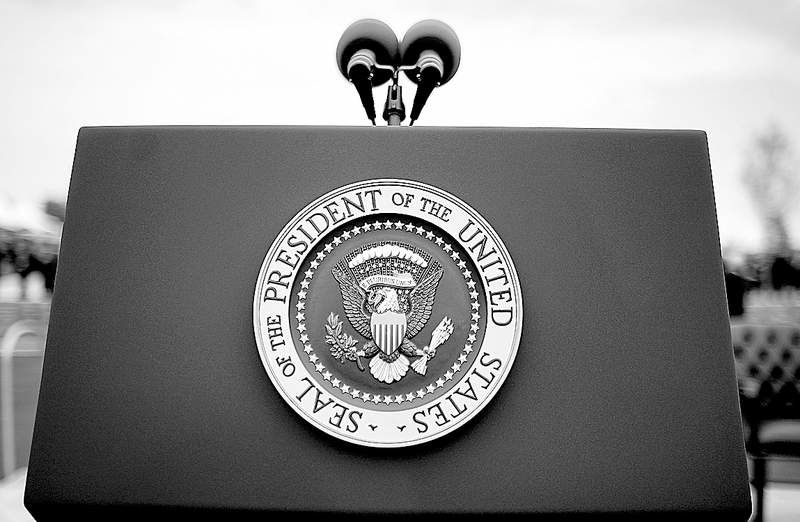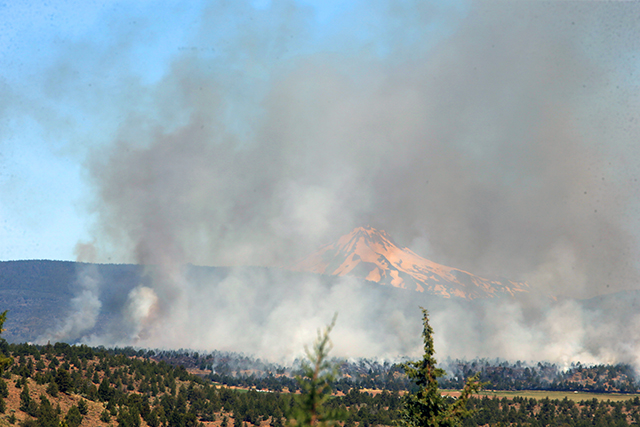Striking the right tone
Published 3:16 am Thursday, January 15, 2009

- New York Times News Service file photo
WASHINGTON — When Barack Obama delivers his inaugural address as the nation’s first African-American president, he’ll be building on 220 years of tradition in which his predecessors also made speechmaking firsts.
The Constitution doesn’t require inaugural speeches. The first president, George Washington, started the tradition in 1789, along with kissing the Bible and saying “so help me God” with the oath of office.
James Monroe, in 1817, gave the first outdoor inaugural address. Dwight Eisenhower, in 1953, prefaced his speech with a prayer. Ronald Reagan, in 1981, was the first to stage the inaugural at the west front of the Capitol. Bill Clinton’s second inauguration, in 1997, was the first to be broadcast on the Internet.
John F. Kennedy was the first Roman Catholic president, but he didn’t focus on that in his 1961 inaugural address. Similarly, while Obama’s breaking of the racial barrier has intensified interest in his inauguration, some historians predict that he won’t dwell on his biracial background in his speech.
“The fact that he’s there and everyone else is addressing it alleviates him of the need,” said Richard Norton Smith, a George Mason University scholar who’s written books about presidents and directed several presidential libraries and museums.
“My sense is he doesn’t want to be thought of as the first black president. He certainly doesn’t want to be defined by it,” Smith said. “Fifty years later, we don’t think of John F. Kennedy as the first Catholic president. We don’t think of FDR as the first disabled president.”
Speeches to admire
A best-selling author with a gift for oratory, Obama faces high expectations for his speech. His advisers and speechwriters declined to share details about their writing process, but it’s a common custom to review previous inaugural addresses when shaping a new one.
Among the most lauded inaugural addresses, and those Obama may be re-reading:
• Thomas Jefferson, trying to conciliate inflamed political passions, said in 1801 that “every difference of opinion is not a difference of principle. … We are all republicans, we are all federalists.”
• Abraham Lincoln told a nation descending into war in 1861 that “we must not be enemies” and called on “the better angels of our nature.” A victorious Lincoln in 1865 pledged “malice toward none, with charity for all” and vowed “to bind up the nation’s wounds.”
• Theodore Roosevelt sought a conciliatory tone in 1905. “We wish peace, but we wish the peace of justice, the peace of righteousness. We wish it because we think it is right and not because we are afraid. No weak nation that acts manfully and justly should ever have cause to fear us, and no strong power should ever be able to single us out as a subject for insolent aggression.”
• Franklin Delano Roosevelt in 1933, amid the Great Depression, promised candor about the nation’s troubles while asserting that “the only thing we have to fear is fear itself.”
• John F. Kennedy said that “the torch has been passed to a new generation of Americans.” He challenged citizens to serve their nation. “Ask not what your country can do for you. Ask what you can do for your country.”
• Gerald Ford, the vice president who was sworn in as president in August 1974 after President Richard Nixon resigned because of the Watergate scandal, asked that his swearing-in speech be thought of as “not an inaugural address, not a fireside chat, not a campaign speech” but rather “just a little straight talk among friends.” In that speech he famously declared that “our long national nightmare is over.”
• Ronald Reagan took over in 1981 amid an economic crisis and as the Iranian hostage crisis ended. He conveyed optimism, dismissing the idea of “inevitable decline” and urging, “Let us begin an era of national renewal.” He also signaled a philosophical shift, saying that “government is not the solution to our problem; government is the problem.” And he warned foreign adversaries, “Our reluctance for conflict should not be misjudged as a failure of will.”
• George H.W. Bush espoused freedom in 1989. “We know what works: Freedom works. We know what’s right: Freedom is right. We know how to secure a more just and prosperous life for man on Earth: through free markets, free speech, free elections, and the exercise of free will unhampered by the state.”
Allan Lichtman, an American University historian, said that Obama could draw profitably from each of those presidents. He regards Lincoln’s second inaugural address as the greatest, and said that “what Obama could take out of Lincoln’s second inaugural is its moral and spiritual message. There are certainly moral and spiritual messages to be delivered now with wars still raging abroad, the American economy in a mess.”
Speeches to avoid
Among the lowest-regarded inaugural speeches:
• William Henry Harrison in 1841. At 8,445 words, it was the longest in history and took almost two hours to deliver on a cold, wet day. He died a month later from pneumonia.
• James Buchanan, in 1857, tried to downplay the political fight over slavery that soon would tear the country in two. Instead of offering leadership on the most urgent problem of the day, Buchanan spoke optimistically of a time “when the public mind shall be diverted from this question to others of more pressing and practical importance.”
Regardless, most inaugural addresses have left slight marks on history.
Donald Ritchie, the Senate’s associate historian, said times of crisis has tended to foster more memorable addresses. “When there’s a lot of trouble going on, (Americans) want something that’s uplifting and gives people a lot of hope and inspires them to get involved,” Ritchie said.
While State of the Union addresses set out a president’s specific goals for a given year, inaugural speeches aim more at themes that make emotional connections, so as “to reunite the country after the divisive election,” Ritchie said.
Politicians including Obama sometimes quote past inaugural addresses while on the campaign trail, but new presidents typically don’t quote their predecessors’ inaugural speeches in their own.
“They use them as a standard, however; as a model,” Ritchie said. “A lot of them are role models for what not to do as much as to do.”
Inaugurations that loom large in history are seen differently at the time.
Abraham Lincoln’s second inaugural speech was panned in some quarters as “a sea of twaddle.” Newspaper front pages were largely silent on Franklin Roosevelt’s call to fear nothing but fear itself. “Ask not” was reflected — not — in leading accounts of John F. Kennedy’s big speech.
It’s possible Americans will again miss the lasting point when Barack Obama becomes president. The present is blind to what the future can see.
Speechwriters, for one group, can’t see the long view. The harder they try to come up with the phrase that lasts forever, the more they are apt to fail, said Theodore Sorensen, a Kennedy speechwriter who, perhaps out of modesty, claimed no authorship of famous lines from Jan. 20, 1961.
Journalists? It’s not for nothing their craft is called the first draft of history.
In 1933, accounts of the day focused on the economic nitty gritty of Roosevelt’s Depression-era address, not his rousing chin-up to the nation.
Roosevelt told the nation: “Let me assert my firm belief that the only thing we have to fear is fear itself — nameless, unreasoning, unjustified terror, which paralyzes needed efforts to convert retreat into advance.”
FDR biographer H.W. Brands, in his 2008 book “Traitor to His Class,” said that line would soon become a landmark of presidential rhetoric.
“At the time it didn’t seem so,” he wrote, “not least since it was patently false. Americans had plenty to fear, starting with massive unemployment, widespread hunger and a collapsing financial system.”
Kennedy’s speech was perceived as a tough-talking Cold War treatise more than as a call to service, generational change and idealism.
“‘Never negotiate out of fear but let us never fear to negotiate’ and ‘pay any price, bear any burden’ are far more important ideas in the Kennedy inaugural address than ‘Ask not,’” said Kathleen Hall Jamieson, director of the Annenberg Public Policy Center at the University of Pennsylvania.
“Pay any price,” in particular, may have forecast not only Kennedy’s steely resolve against the Soviets but U.S. involvement in Vietnam.
Yet the future most remembers Kennedy’s finger-jabbing demand: “Ask not what your country can do for you. Ask what you can do for your country.”
(Asked by The New York Times last year whether he wrote that, Sorensen coyly replied, “Ask not.”)
— The Associated Press






